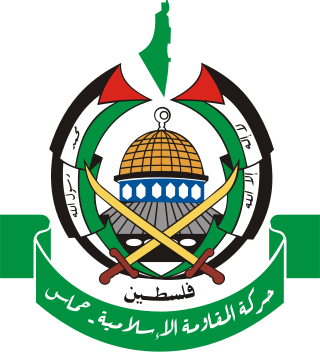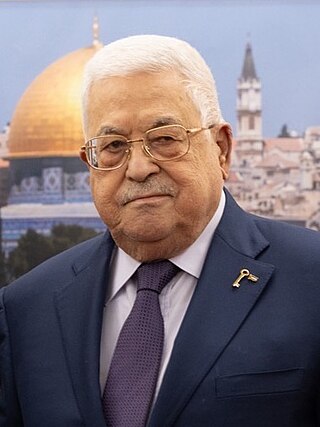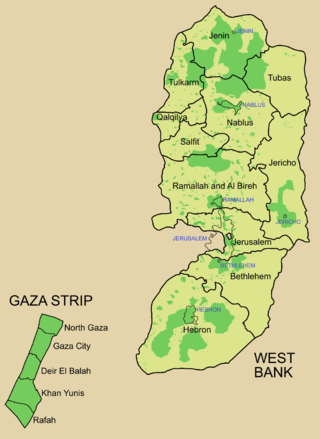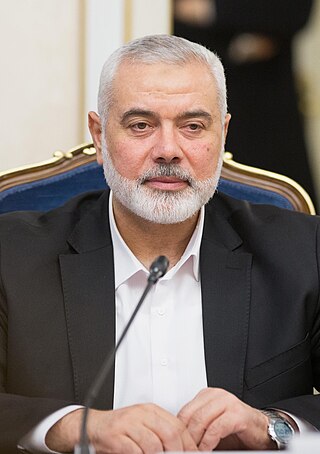Related Research Articles

The Islamic Resistance Movement, abbreviated Hamas, is a Palestinian nationalist Sunni Islamist political organisation with a military wing called the Ezzedeen Al-Qassam Brigades. It has governed the Israeli-occupied Gaza Strip since 2007.

The Palestinian Authority, officially known as the Palestinian National Authority or the State of Palestine, is the Fatah-controlled government body that exercises partial civil control over the Palestinian enclaves in the Israeli-occupied West Bank as a consequence of the 1993–1995 Oslo Accords. The Palestinian Authority controlled the Gaza Strip prior to the Palestinian elections of 2006 and the subsequent Gaza conflict between the Fatah and Hamas parties, when it lost control to Hamas; the PA continues to claim the Gaza Strip, although Hamas exercises de facto control. Since January 2013, the Palestinian Authority has used the name "State of Palestine" on official documents, although the United Nations continues to recognize the Palestinian Liberation Organization (PLO) as the "representative of the Palestinian people".

Mahmoud Abbas, also known by the kunya Abu Mazen, is a Palestinian politician who is the president of the State of Palestine and the Palestinian National Authority (PNA). He has been the chairman of the Palestine Liberation Organization (PLO) since 2004, PNA president since January 2005, and State of Palestine president since May 2005. Abbas is also a member of the Fatah party and was elected chairman in 2009.
Mohammad Yusuf Dahlan is a Palestinian politician. Arrested by Israel for being involved with the Fatah Hawks—the Fatah youth movement—he subsequently helped in negotiations for the Oslo Accords, later becoming a critic of Yasser Arafat. The former leader of Fatah in the Gaza Strip, Dahlan's power there as head of the Preventive Security Force was at one time so substantial that the territory was nicknamed "Dahlanistan". Seen as a favorite by the George W. Bush administration to be Mahmoud Abbas' second-in-command, Dahlan was appointed by the latter to head the Palestinian National Security Council. An antagonist of Hamas, he participated in the Fatah–Hamas Mecca Agreement before his power began to decline after the latter gained the upper hand in the Battle of Gaza. He was controversially elected to the Central Committee of Fatah amid allegations of fraud. Living in exile in Abu Dhabi, Dahlan has, according to Foreign Policy, had a hand in facilitating the Abraham Accords.
This page is a partial listing of incidents of violence in the Israeli-Palestinian conflict in 2005.
The government of Palestine is the government of the Palestinian Authority or State of Palestine. The Executive Committee of the Palestine Liberation Organization (EC) is the highest executive body of the Palestine Liberation Organization and acts as the government. Since June 2007, there have been two separate administrations in Palestine, one in the West Bank and the other in the Gaza Strip. The government on the West Bank was generally recognised as the Palestinian Authority Government. On the other hand, the government in the Gaza Strip claimed to be the legitimate government of the Palestinian Authority. Until June 2014, when the Palestinian Unity Government was formed, the government in the West Bank was the Fatah-dominated Palestinian government of 2013. In the Gaza Strip, the government was the Hamas government of 2012. Following two Fatah–Hamas Agreements in 2014, on 25 September 2014 Hamas agreed to let the PA Government resume control over the Gaza Strip and its border crossings with Egypt and Israel, but that agreement had broken down by June 2015, after President Abbas said the PA government was unable to operate in the Gaza Strip.
The Palestinian Authority Government of March 2006, also known as the First Haniyeh Government, was a government of the Palestinian National Authority (PA), led by Ismail Haniyeh, that was sworn in on 29 March 2006 and was followed by the Palestinian unity government of 17 March 2007. On 25 January 2006, Hamas won the election for the Palestinian Legislative Council (PLC) with 44.4% of the vote vs Fatah's 41.4%, and its leader Haniyeh formed the government, which comprised mostly Hamas members as well as four independents, after Fatah and other factions had refused to form a government with Hamas. It was the first Hamas-led PA government in the Palestinian territories.

The Fatah–Hamas conflict is an ongoing political and strategic conflict between Fatah and Hamas, the two main Palestinian political parties in the Palestinian territories, leading to the Hamas takeover of the Gaza Strip in June 2007. The reconciliation process and unification of Hamas and Fatah administrations remains unfinalized and the situation is deemed a frozen conflict.
Ahmed al-Jabari, also known as Abu Mohammad, was a senior leader and second-in-command of the military wing of Hamas, the Izz ad-Din al-Qassam Brigades. He was widely credited as the leading figure in the Hamas takeover of the Gaza Strip, and commanded the 2006 Hamas cross-border raid which resulted in the capture of Israeli soldier Gilad Shalit. Under his command, along with chief logistics officer Mahmoud al-Mabhouh, Hamas developed its own military weapons capability significantly by acquiring longer-range guided missiles and rockets.

The next legislative elections in Palestine have been repeatedly postponed or cancelled. Most recently it was scheduled for 22 May 2021 according to a decree by President Mahmoud Abbas on 15 January 2021, but was indefinitely postponed on 29 April 2021.

The 2009 Hamas political violence took place in the Gaza Strip during and after the 2008–2009 Israel–Gaza conflict. A series of violent acts, ranging from physical assaults, torture, and executions of Palestinians suspected of collaboration with the Israel Defense Forces, as well as members of the Fatah political party, occurred. According to Human Rights Watch, at least 32 people were killed by these attacks: 18 during the conflict and 14 afterward, and several dozen more were maimed, many by shots to the legs.

Hamas has governed the Gaza Strip in Palestine since its takeover of the region from rival party Fatah in June 2007. Hamas' government was led by Ismail Haniyeh from 2007 until February 2017, when Haniyeh was replaced as leader of Hamas in the Gaza Strip by Yahya Sinwar. As of November 2023, Yahya Sinwar continues to be the leader of Hamas in the Gaza Strip. In January 2024, due to the ongoing Israel–Hamas war, Israel said that Hamas lost control of most of the northern part of the Gaza Strip. In May 2024, Hamas regrouped in the north.
Events in the year 2013 in the State of Palestine.
The prime minister of the Palestinian National Authority was the position of the official head of government of the Palestinian Authority government, which operated between 2003 and January 2013, when it was officially transformed into the State of Palestine. Some still refer to the position of the prime minister of the Gaza Strip as the prime minister of the Palestinian National Authority.

Legislative elections were held in the Palestinian territories on 25 January 2006 in order to elect the second Palestinian Legislative Council (PLC), the legislature of the Palestinian National Authority (PNA). The result was a victory for Hamas, contesting under the list name of Change and Reform, which received 44.45% of the vote and won 74 of the 132 seats, whilst the ruling Fatah received 41.43% of the vote and won 45 seats.

The Palestinian Legislative Council (PLC) is the unicameral legislature of the Palestinian Authority, elected by the Palestinian residents of the Palestinian territories of the West Bank and Gaza Strip. It currently comprises 132 members, elected from 16 electoral districts of the Palestinian Authority. The PLC has a quorum requirement of two-thirds, and since 2006 Hamas and Hamas-affiliated members have held 74 of the 132 seats in the PLC. The PLC's activities were suspended in 2007 and remained so as of November 2023, while PLC committees continue working at a low rate and parliamentary panel discussions are still occurring.

The Battle of Gaza or the Gaza civil war was a brief civil war between Fatah and Hamas that took place in the Gaza Strip from 10 to 15 June 2007. It was a prominent event in the Fatah–Hamas conflict, centered on the struggle for power after Fatah lost the 2006 Palestinian legislative election. The battle resulted in the dissolution of the unity government and the de facto division of the Palestinian territories into two entities: the West Bank governed by the Palestinian National Authority (PNA), and the Gaza Strip governed by Hamas. Hamas fighters took control of the Gaza Strip, while Fatah officials were either taken as prisoners, executed, or expelled. The Palestinian Centre for Human Rights reported that at least 161 people were killed and more than 700 were wounded during the fighting.

Ismail Haniyeh was a Palestinian politician who served as chairman of the Hamas Political Bureau from May 2017 until his assassination in July 2024. He also served as prime minister of the Palestinian National Authority from March 2006 until June 2014 and Hamas leader in the Gaza Strip from June 2007 until February 2017, where he was succeeded by Yahya Sinwar.

A series of attempts to resolve the hostility between Fatah and Hamas have been made since their 2006–2007 conflict and the subsequent violent conflict over the Gaza Strip.

The Palestinian Unity Government of June 2014 was a national unity government of the Palestinian National Authority under Palestinian President Mahmoud Abbas formed on 2 June 2014 following the Fatah-Hamas Reconciliation Agreement that had been signed on 23 April 2014. The ministers were nominally independent, but overwhelmingly seen as loyal to President Abbas and his Fatah movement or to smaller leftist factions, none of whom were believed to have close ties to Hamas. However, the Unity Government was not approved by the Legislative Council, leading to its legitimacy being questioned. The Unity Government dissolved on 17 June 2015 after President Abbas said it was unable to operate in the Gaza Strip.
References
- ↑ "Haniye nombra mandos leales de seguridad para Gaza". Archived from the original on 7 October 2011. Retrieved 19 September 2009.
- ↑ http://www.monstersandcritics.com/news/middleeast/news/article_1318444.php/Palestinian_split_widens_as_Fatah_and_Hamas_consolidate__Roundup?compage=20&comcount=23&comlimit=20%5B%5D